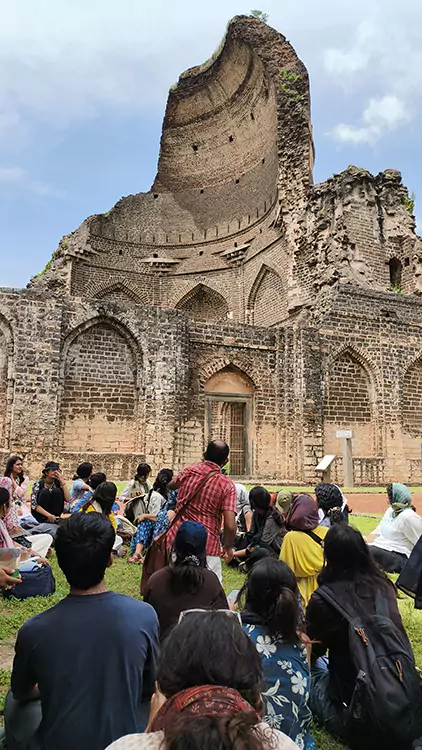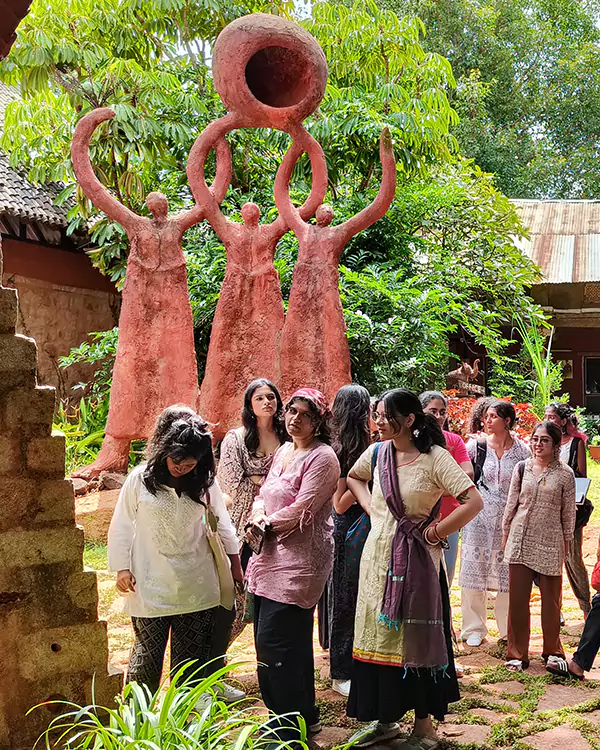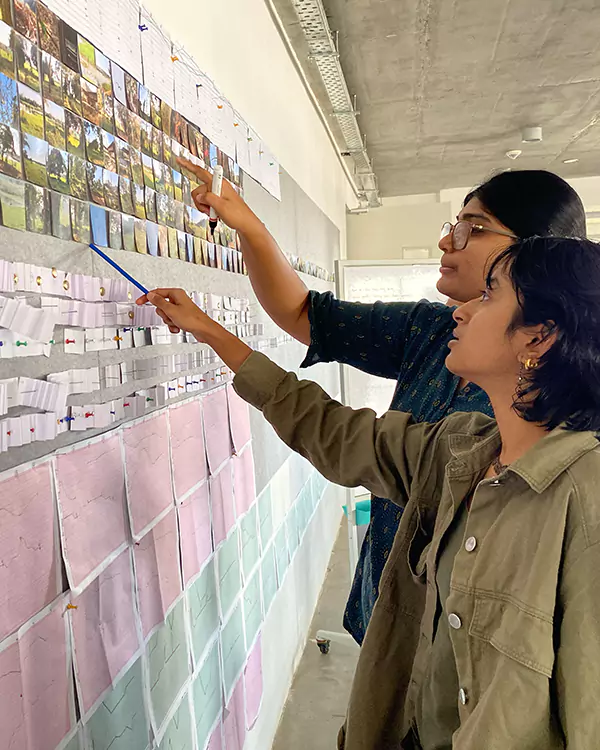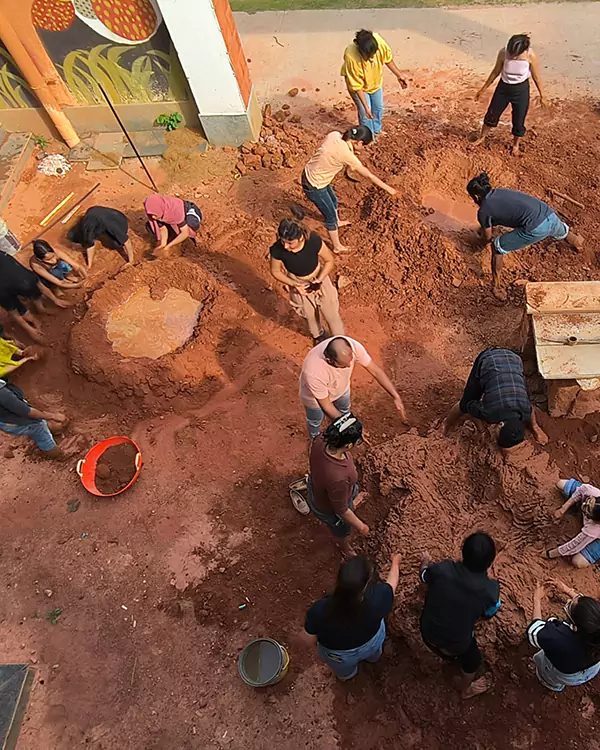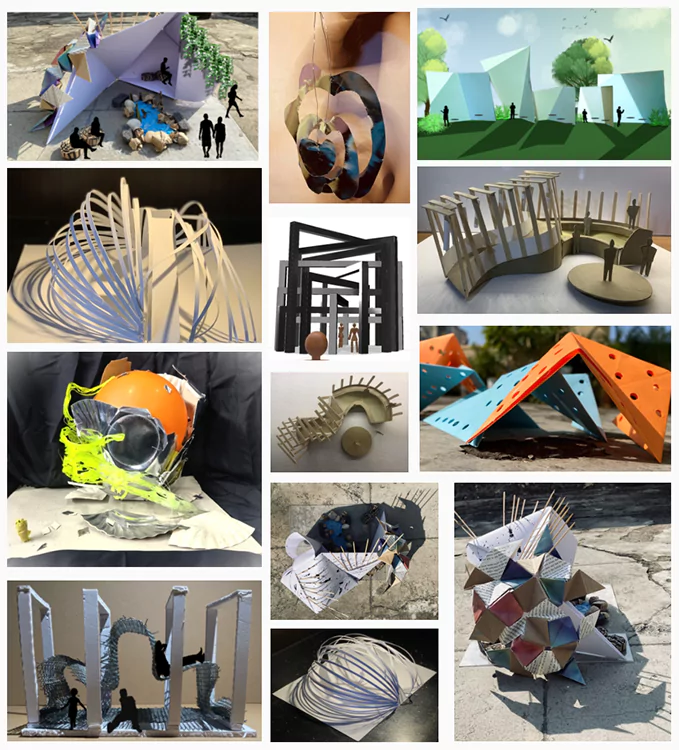4-YEAR UG Professional Program
Public Space Design

Course Overview
B Des in Public Space Design at Srishti Manipal Institute (SMI) situates itself within spatial design discipline that offers the creative minds an opportunity to engage with the diverse scales and contexts of collective experiences. The course offers tools & methods to think, design and research the three-dimensional realm of space, which is inhabited by human and other beings.
Great opportunities are emerging for spatial design practitioners in the planned, unplanned, temporary and permanent spaces across diverse scales ranging from chai points to cafes, neighbourhood shops to brand environments, every day meeting spaces to community centres; bus stops to places of mass transit, reading rooms to public libraries, from healthcare spaces to hospitality spaces, creative set designs to exhibition & event spaces to mention a few.
The course aligns with ethos of interdisciplinary and inclusive design practice and pedagogy. The course, one of a kind in India, offers an interdisciplinary, choice-based course navigation through the four-year learning at an undergraduate level, allowing for student-centric learning and creative focus area learning that a student can navigate to develop a unique portfolio of work.
B.Des in Public Space Design course allows aspiring spatial design practitioners an opportunity to navigate their interest & focus within diverse spatial environments including interior environments, interactive & experiential & immersive environments, community environments, urban environments, etc. These diverse avenues allow them to explore and situate their practice as interior & furniture designers, set designers, curators of experiential spaces, exhibitions, expos, designers and community & placemaking practitioners working towards a collaborative & participatory engagement, strategists, systems thinkers, and researchers to engage with the urban, or as an artistic practitioner working towards social and environmental agenda, etc.
Vision
The vision of the Public Space Design course is to nurture conscious, informed, agile, and confident creative practitioners who can contribute to the spatial design discipline through research, imagination & creation of collective environments that are sustainable, equitable and inclusive.
Course Focus
The Public Space Design course dwells with ‘space’ as a 3-dimensional canvass to engage with and ‘design’ as a process or method to engage with space thereby offering tools and methods to observe, understand, imagine, create and investigate the diverse spatial environments which humans and other living species inhabit. Through the lenses of equity, inclusion, gender, accessibility, safety, socio-political references, community engagements and sustainable development, etc., the course approaches space design beyond its aesthetical and functional agenda and allows for critical thinking to expand the boundary of spatial design practice while enriching the students with skills that keep them ahead of the curve
LEVEL
Undergraduate Degree
AWARD
Bachelor of Design (B.Des)
DURATION
4 Years / Full-time
Core Values
Core Values:
- Empathy and Passion towards social inclusion and equity
- Celebrating Diversity & Connectedness across contexts and communities
- Ecological consciousness and the well-being of community & environment
Course Structure
Course Structure:
The course comprises of foundation courses, studio based making and learning, critical reading and writing, internships, electives and project-based semesters.
- Foundation introduces students to basic principles and tools of Art, Design and Technology as methods, tools and processes.
- Disciplinary Studios are learning spaces where students develop core disciplinary capabilities, while navigating a trans-disciplinary environment
- General Studies is a common and compulsory programme of study that integrates Humanities, Sciences, Maths, business and finance. Development and Policy Studies and also offers Languages (Spanish, French and German)
- Interim is an immersive introduction to practice in new and emerging areas of art and design and environmental exposure
- Electives are of three kinds – this program allows students to expand their skills, develop the interests as well as provide opportunities for travel exchange
- Internship/Apprenticeship is compulsory work experience done over the summer-break between the 6th and 7th semester
- Project based learning involves the application and synthesis of capabilities acquired. Two projects, pre-thesis and thesis, is culmination of the 4-year undergraduate program, which allows for demonstration of an integration of values, positions, capabilities and practice.
Learning Approach
Learning Approach:
The core values are experienced through a range of interdisciplinary learning approaches:
- Driven by Enquiry through generative themes that are rooted around historical, socio-cultural and political contexts
- Studio Based Learning is encouraged, where students work in teams.
- Theoretical and Critical approach to expand the idea of art and design practice
- Hands-on approach to making for developing self-expression,
- Research and collaborations as ways to widen thought and dimensions of practice.
- Field based enquiry making the real-world into a classroom
- Participatory approach through direct engagement with communities of various practitioners
- Participatory Approach & Fieldwork
Capabilities
Capability Set:
Upon successful completion of this course graduates will have developed the following capabilities:
- To effectively design, visualize, communicate and represent spatial design concepts and ideas to a larger audience.
- Iterating to translate a line of thinking into a desired form by drawing from one’s exposure to various practices, and to hone skill by repetitive use of certain tools.
- To collaborate & co-design with communities to understand and design for their needs and well-being.
- To work in professional environments with integrity and competence.
- To understand, explore and creatively work with materials, services, and systems.
- To understand complexities of multifaceted contexts and develop an integrated and comprehensive approach to design.
- To be able to think critically through reflection and identify patterns to develop one’s practice independently.
FAQs
In the context of B.Des. Public Space Design course offered at Srishti Manipal Institute, students explore and engage with the spaces & contexts of collective experiences. The course builds and expands the notion of spatial design with a clear focus on understanding, imagination and creation of spaces that come in various forms, including those used for recreation, knowledge, care, commerce, temporal and pop-up events, public infrastructure and public amenities.
This course approaches spatial design beyond its form, aesthetic and functional agenda and encourages critical thinking to engage with space as a platform or catalyst to respond to the social context and needs. Interdisciplinary and inclusive design practice and pedagogy of the institute allows the course to expand and strengthen the practice of spatial design with diverse perspectives from other disciplines such as liberal arts, humanities, industrial design, communication design, creative education, systems & service design, etc. to create equitable, inclusive, just, and resilient spaces.
Students from all academic backgrounds of arts, commerce and science, who are passionate about imagining spaces, curating experiences, and narrating stories using space as a three-dimensional canvas, would cherish the course offerings. Individuals with inclination towards collaborative learning & critical perspectives with strong interest around themes such as body & space, community and culture, gender and equity, space & place, sustainability and well-being, etc. are welcome to apply. If you value the explorative learning modes, the choice-based course navigation through the four-years will allow you the student-centric learning and creative navigation to develop your individual portfolio of practice.
B.Des in Public Space Design course allows aspiring spatial design practitioners an opportunity to navigate their interest & focus within diverse spatial environments including interior environments, interactive & experiential environments, immersive phygital environments, community environments, urban environments, etc. The program equips the graduates to be confident, agile and creative individuals with an ability to navigate both professional and research inclined spatial design practices.
Professional Practice:
- Spatial designer in architecture, interior and furniture design studios
- Set design and Immersive event spaces
- Exhibition & Experiential Space Curation
- Place-making & Community building Initiatives
- Art activism & public art
- Community consultation, user experience & design research
- Urban strategist & Researchers
Development sector opportunities with government and government-allied agencies, consultancy and advocacy firms working in the urban or rural sector such as street (re)design, public space (re)design, design of public and public transit facilities, etc.
Academic & Research Practice:
The course equips the graduates with research opportunities as research assistants or independent researchers in leading research organizations working in diverse domains suggested above. The course further assists in developing expertise and eligibility for pursuing master’s opportunities offered at Srishti Manipal as well as at other national & international universities of repute.


